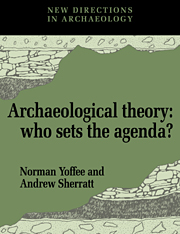Book contents
- Frontmatter
- Contents
- List of figures
- List of contributors
- Introduction: the sources of archaeological theory
- PART I THE SOCIAL CONTEXT OF ARCHAEOLOGICAL THEORY
- PART II ARCHAEOLOGICAL THEORY FROM THE PALAEOLITHIC TO THE STATE
- PART III CASE STUDIES IN ARCHAEOLOGICAL THEORY AND PRACTICE
- PART IV EPILOGUE
- Index
Introduction: the sources of archaeological theory
Published online by Cambridge University Press: 03 May 2010
- Frontmatter
- Contents
- List of figures
- List of contributors
- Introduction: the sources of archaeological theory
- PART I THE SOCIAL CONTEXT OF ARCHAEOLOGICAL THEORY
- PART II ARCHAEOLOGICAL THEORY FROM THE PALAEOLITHIC TO THE STATE
- PART III CASE STUDIES IN ARCHAEOLOGICAL THEORY AND PRACTICE
- PART IV EPILOGUE
- Index
Summary
Abstract
Archaeological theory is not independent of the problems that need to be solved: it arises out of particular problems and articulates them with others. This volume explores how widely discussed bodies of theory relate to the major problem–domains studied by archaeologists.
There has never been a unified school of archaeology: just as today, the subject has always been characterized by competing theoretical stances that often arise from different bodies of data and attendant problems of interpretation.
If “archaeology” is more than a word that completely changes its meaning according to context, however, there should be some common ground among its practitioners in various branches of the discipline. One expects some community of ideas and approaches, especially an explicit understanding of how “appropriate theory” is matched to the various problems with which archaeologists have to deal.
Typically, however, “theoretical schools” have arisen and claimed to have a privileged status in determining what constitutes valid explanation in archaeological research, and the recent literature shows that this is still the case. In historical perspective, such schools are clearly seen not only as grounded in partial bodies of empirical material but also as reactions to preceding theoretical positions and are themselves likely to be superseded.
Despite the evident dangers of advancing universal prescriptions, however, a significant part of the explicitly theoretical literature in archaeology today consists of polemical claims to novel and exclusive sources of truth.
- Type
- Chapter
- Information
- Archaeological TheoryWho Sets the Agenda?, pp. 1 - 10Publisher: Cambridge University PressPrint publication year: 1993
- 12
- Cited by

